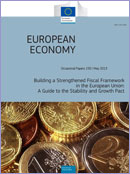|
|
|
|
|
|
 |
 |
 |
 |
Commission issues annual country specific policy recommendations to move Europe beyond the crisis
The European Commission has adopted recommendations to EU Member States designed to move Europe beyond the crisis and strengthen the foundations for growth. The annual set of country specific policy recommendations issued on 29 May are based on a detailed assessment of the economic, employment and budgetary situation in each country and on the policy plans that countries have submitted under the European Semester. The Commission’s analysis shows that the EU is making lasting changes and is tackling the serious structural problems that built up over the last decade. A rebalancing of the EU economy is underway, and most Member States are making progress on fiscal consolidation and are implementing reforms to increase competitiveness. Challenges remain, however, including high levels of unemployment – particularly among youth – in some Member States, the need to do more to create the conditions for businesses to invest and create jobs while maintaining fairness, and remaining pockets of vulnerability in the banking sector. The recommendations will be endorsed by the European Council in June and formally adopted by the Council in July.
|
 |
 |
 |
|
 |
 |
 |
 |
 |
|
 |
 |
 |
| Now is the time to step up the fundamental economic reforms that will deliver growth and jobs, which our citizens, especially our young people, anxiously expect. This is the only way to address the two lasting legacies of this crisis – the serious loss of competitiveness in many of our Member States, and persistent unemployment, with all its social consequences. The recommendations issued by the Commission today are part of our comprehensive strategy to move Europe beyond the crisis. They are concrete, realistic, and adapted to the situation of each of our Member States. |
 |
José Manuel Barroso, President of the European Commission
|
|
|
|
 |
 |
 |
 |
Commission takes steps under the Excessive Deficit Procedure
On 29 May, the Commission made public several recommendations under the Excessive Deficit Procedure (EDP). The Commission recommended that the Council abrogate the EDP for five countries: Italy, Latvia, Hungary, Lithuania and Romania and open an EDP for Malta. Moreover, the Commission recommended that the Council extend the deadlines for correcting excessive deficits in six countries: Spain, France, the Netherlands, Poland, Portugal and Slovenia. The Commission also advised the Council to decide that no effective action has been taken by Belgium to put an end to its excessive deficit and recommended that the Council therefore give notice to Belgium to take measures to correct the deficit by 2013. At the moment there is an EDP ongoing for 20 EU Member States. This means all EU Member States except Bulgaria, Germany, Estonia, Luxembourg, Malta, Finland and Sweden are subject to an EDP. If the Council follows the Commission’s most recent recommendations, the overall number of countries in EDP, then including Malta, will drop to 16.
|
 |
|
 |
 |
|
 |
 |
 |
 |
‘Two-Pack’ enters into force: Regulations to strengthen euro area budgetary surveillance
The ‘Two-Pack’ set of Regulations designed to further strengthen budgetary surveillance in the euro area entered into force on 30 May. Complementing the ‘Six-Pack’ in force since December 2011, the two new Regulations are designed to reduce the potential for spillover effects within the euro area. The new measures will ensure increased transparency on euro area Member State budgetary decisions, stronger coordination in the euro area starting with the 2014 budgetary cycle, and the recognition of the special needs of euro area Member States under severe financial pressure. While the first Regulation applies to all euro area Member States, with special rules made for those in the Excessive Deficit Procedure as the corrective arm of the Stability and Growth Pact, the second Regulation sets out clear and simplified rules for enhanced surveillance for euro area Member States facing severe difficulties with regard to their financial stability, for those receiving financial assistance, and for those exiting a financial assistance programme.
|
 |
|
 |
 |
|
 |
 |
 |
 |
ECFIN Website: revised section on the Stability and Growth Pact
To reflect the entry into force of the Two Pack regulations, DG ECFIN has enhanced its web pages on the Stability and Growth Pact (SGP), the EU’s rule-based framework for the coordination and surveillance of fiscal policy. The new information provides an overview of the current SGP framework and the latest reforms to the Pact, including the Two Pack’s provisions on enhanced monitoring and surveillance for euro area Member States. The information aims to promote a better understanding of the SGP framework, including the two arms of the Pact—the preventive arm and the corrective arm. The website is complemented by a publication on the SGP, which provide a more in-depth presentation of the framework, and a manual presenting the implementing procedures and methodologies.
|
 |
|
 |
 |
|
 |
 |
 |
 |
Commission carries out Third Post-Programme Surveillance mission to Latvia
The third Post-Programme Surveillance (PPS) mission to Latvia was carried out by the Commission services from 13 to 15 May, together with the European Central Bank (ECB). The PPS missions are a follow up to the three-year financial support programme by the EU, which concluded successfully on 20 January 2012. PPS missions are scheduled to take place twice a year until 75% of the EU loan provided to Latvia has been repaid (expected in 2015). The Commission commended Latvia for its economic and budgetary performance, including budget control, since the last PPS visit in November 2012, but noted that pressures to spend are likely to grow in the coming months. A comprehensive assessment of Latvia’s reforms was published on 29 May as part of the EU country specific recommendations for Latvia.
|
 |
|
 |
 |
|
 |
 |
 |
 |
European Council agrees on measures to combat tax evasion and fraud, welcomes negotiations with Switzerland, Liechtenstein, Monaco, Andorra and San Marino
European leaders agreed during their meeting on 22 May to strengthen measures to combat tax evasion and tax fraud. Priority will be given to efforts to extend the automatic exchange of information at the EU and global levels. The leaders also welcomed the agreement reached by the ECOFIN Council of EU finance ministers on a negotiating mandate for strengthened savings tax agreements with Switzerland, Liechtenstein, Monaco, Andorra and San Marino. Other issues discussed by the European Council included the taxation of savings income, fighting VAT fraud, aggressive tax planning and profit shifting, and the elimination of harmful tax measures.
|
 |
|
 |
 |
|
 |
 |
 |
 |
Commission strengthens EIB lending outside EU for the coming seven years
The European Commission has adopted a proposal to support the financing of investment projects outside the EU by the European Investment Bank (EIB), on the basis of an EU budgetary guarantee. The proposal adopted on 23 May streamlines the objectives of EIB financing and provides for more focused resources to tackle climate change and to support pre-accession partners and the EU’s southern and eastern neighbours. It envisages the provision of an EU budgetary guarantee for up to EUR 28 billion of EIB financing operations outside the EU, out of which EUR 3 billion would be optional and possibly activated after a mid-term review. The new legislation covers the period 2014-2020 and is likely to be adopted in the coming year.
|
 |
|
 |
 |
|
 |
 |
 |
 |
Annual inflation down to 1.2% and 1.4% in the euro area and EU respectively
Euro area annual inflation was 1.2% in April 2013, down from 1.7% in March. A year earlier the rate was 2.6%. Monthly inflation was -0.1% in April 2013. European Union annual inflation was 1.4% in April 2013, down from 1.9% in March. A year earlier the rate was 2.7%. Monthly inflation was 0.0% in April 2013. The figures were released on 16 May by Eurostat, the statistical office of the European Union.
|
 |
|
 |
 |
|
 |
 |
 |
 |
Commission proposes measures to help crisis-hit countries more easily use EU Cohesion Funds
The European Commission has proposed measures to help crisis-hit countries to more easily use EU funds. The measures proposed on 21 May would help these Member States to tackle youth unemployment, to support small and medium sized business and to pay for key infrastructure projects. In the absence of this measure, Cohesion Policy investments for growth could be lost because of a lack of time to spend the money or because of the difficulty of finding national and private co-financing in the current economic climate. The first measure would help to deliver around EUR 500 million in growth promoting investments more quickly to Greece, Cyprus and Portugal. It would increase the EU contribution, allow a lower national share, and prolong an agreement on co-financing from December 2011 for another two years. The second measure would give Romania and Slovakia more time to spend Cohesion Policy money.
|
 |
|
 |
 |
|
|
|
 |
 |
 |
 |
Building a strengthened fiscal framework in the EU: A guide to the Stability and Growth Pact. European Economy. Occasional Paper 150
This publication provides an overview of the Stability and Growth Pact (SGP), the rule-based framework for fiscal policy in the EU. The first section takes an historical look at the evolution of the SGP framework, presenting the changes that have been made to the framework over the years and discussing the reasons for the reforms. The second section provides a description of the application of the SGP today, looking at the Pact’s two arms: the preventive arm, which aims to ensure sound budgetary policies during normal economic times, and the corrective arm, which implements the Excessive Deficit Procedure when a Member State’s deficit or debt is judged to be too high. This guide is complemented by a “Vade mecum on the Stability and Growth Pact” which contains a detailed description of the procedures and methodologies for implementing the Stability and Growth Pact (SGP) and is aimed primarily at technicians working on budgetary policies.
|
|
 |
|
|
|
|
|
|
|
|
|
|
|
|
|
|
|
 |
| Directorate-General for Economic and Financial Affairs |
 |
|